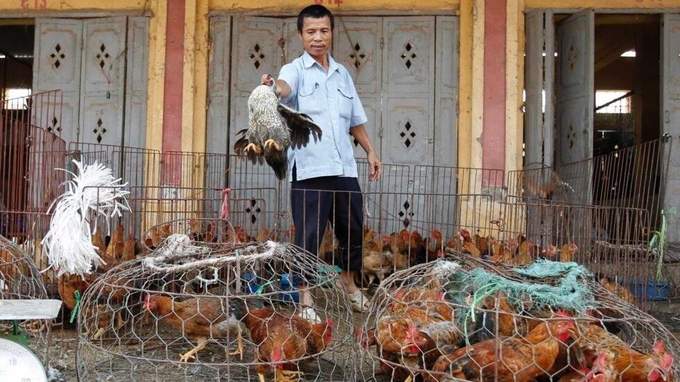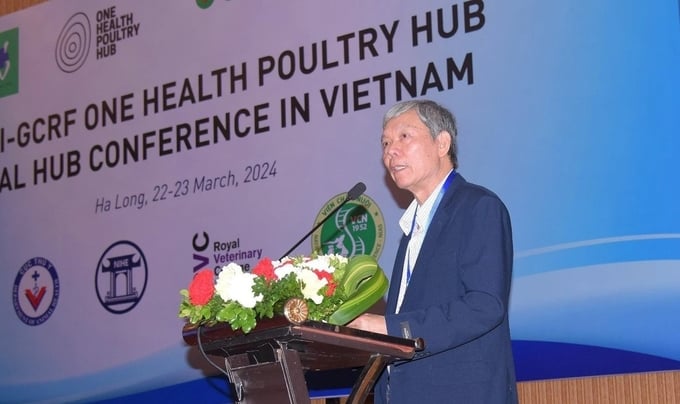May 30, 2025 | 18:02 GMT +7
May 30, 2025 | 18:02 GMT +7
Hotline: 0913.378.918
May 30, 2025 | 18:02 GMT +7
Hotline: 0913.378.918
As per the Ministry of Agriculture and Rural Development, the current number of small-scale animal slaughterhouses nationwide exceeds 22,000. The establishments in issue lack adequate disease control and food safety procedures (due to non-compliance with business registration requirements), and it is impossible to trace the origin of livestock products.
According to research findings, a notable 20% of chickens based in live poultry markets and slaughterhouses in northern Vietnam tested positive for the H9N2 avian influenza virus. Although this virus is classified as having low pathogenicity, it continues to inflict substantial economic harm upon poultry farming households using increased treatment costs, raised mortality rates, and diminished growth rates. In addition to causing illness in humans, the H9N2 strain has the potential to mutate into a new variant that could spark a pandemic.

"One Health" is an approach that recognizes the intimate relationship between human health, animal health, and the environment. Photo: Nguyen Thanh.
Notably, 30% of poultry markets and slaughterhouses tested positive for Campylobacter, another type of bacteria that can cause food poisoning, while 50% tested positive for Salmonella, a type of bacteria that can cause food poisoning.
The annual growth rate of Vietnam's total poultry population was 5.6% between 2010 and 2020. By 2025, this quantity is anticipated to surpass 500 million, which corresponds to an annual production of 18 billion eggs.
Conditions are created for the growth and spread of pathogens (microorganisms that cause disease), which hinders efforts to produce safe and sustainable food through intensive poultry farming. It also increases the possibility that diseases will be transmitted from animals to humans, which could result in future pandemics and outbreaks.
The One Health Poultry Project, an international research initiative spanning five years, aims to investigate the new diseases that pose a threat to poultry husbandry and trade in Vietnam and other countries in Southeast and South Asia.
The director of the One Health Poultry Project, Professor Fiona Tomley of the Royal Veterinary College in the United Kingdom, stated that the initiative is the first research program in Vietnam to utilize the "One Health" approach to examine disease risks throughout the poultry production and distribution chain (from farms to tables).
The "One Health" approach acknowledges the mutual dependence of the environment, animal health, and human health. Therefore, in order to optimize health outcomes for each of these factors, it is imperative to establish efficient interdisciplinary collaboration among disciplines associated with the environment, animals, plants, and human health.

Professor Vu Dinh Ton, head of the branch of the One Health Poultry Research Project in Vietnam. Photo: Nguyen Thanh.
Additional authorities have identified factors that impact the distribution and presence of antibiotic resistance and avian influenza viruses and pathogenic bacteria, as well as the proliferation of such pathogens throughout the poultry supply chain.
Avian influenza poses an ongoing menace to the poultry sector in Vietnam, resulting in financial setbacks and impeding the means of subsistence for poultry producers. Future human influenza epidemics may also be influenced by avian influenza viruses.
Salmonella and Campylobacter bacteria-associated food poisoning in poultry poses a severe threat to human health and is potentially fatal. Antibiotic resistance is a phenomenon that the World Health Organization ranks among the ten greatest hazards to global health.
"Although the Vietnamese government's long-term policy encourages the construction and operation of large-scale modern slaughterhouses, their development and operation are constrained by factors such as the variety of slaughter methods, land use rights, and culinary preferences." Assisting small-scale slaughter operators in maintaining biosecurity and operating under safe conditions will yield numerous health advantages for the community, according to Professor Fiona Tomley.
Information gathered for the development of sustainable economic, social, and environmental policies and interventions to enhance the health of humans, animals, and society as a whole is the objective of this endeavor. Vietnam research groups have put forth policy recommendations encompassing a range of topics, including poultry markets, poultry slaughter, biosecurity, the influence of gender on poultry disease prevention, and One Health.
The head of the project branch in Vietnam, Professor Vu Dinh Ton of the Vietnam Academy of Agricultural Sciences, remarked, "This project is truly special due to the participation of numerous partners from Vietnam and around the globe. The varied backgrounds of collaborators has generated an important resource for interdisciplinary collaboration and the logical resolution of issues.
"Following five years of project execution, we have attained significant outcomes that hold relevance in the formulation of policies and the suggestion of measures to prevent and control diseases." Furthermore, the endeavor has facilitated connections between scholars and interested parties on a global and domestic scale”, Professor Vu Dinh Ton underscored.
Translated by Linh Linh

(VAN) Vaccinating juvenile pangasius helps reduce disease, antibiotic use, and farming costs, increasing profits for export-oriented farmers in An Giang.

(VAN) Due to a limited supply of workforce and competitive recruitment requirements, businesses struggle to retain talented veterinary human resources.

(VAN) WOAH’s guidance aims to mitigate disease risks through a One Health approach that balances economic, conservation, and public health interests.

(VAN) Ms. Nguyen Thi Dung, Deputy Director of Ngoc Hoang Cooperative, shared about the journey of bringing dragon fruit to Europe, achieving annual revenues in the billions of VND.

(VAN) Bamboo products from Thang Tho Bamboo Cooperative have reached many countries around the world, while also creating jobs for local workers.

(VAN) The Management Board of Con Dao National Park reported that a green sea turtle, tagged in the Philippines, has traveled thousands of kilometers to lay 84 eggs on Bay Canh Islet.

(VAN) Green technology is paving a new path for sustainable aquaculture in the Mekong Delta in particular and across the country in general, helping reduce emissions and adapt to climate change.